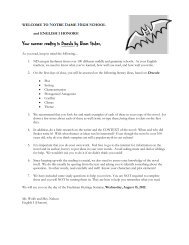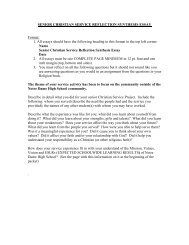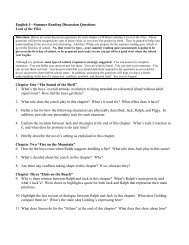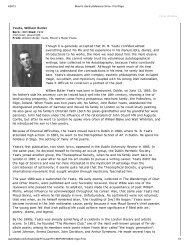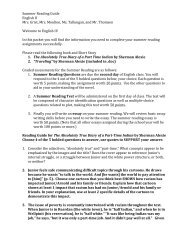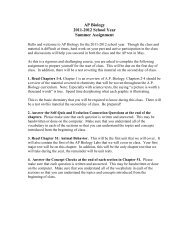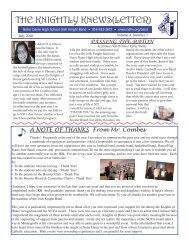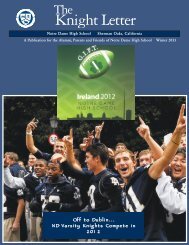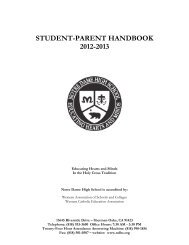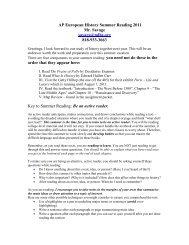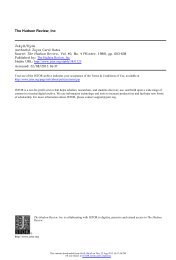dr. jekyll and mr. hyde
dr. jekyll and mr. hyde
dr. jekyll and mr. hyde
Create successful ePaper yourself
Turn your PDF publications into a flip-book with our unique Google optimized e-Paper software.
DR. JEKYLL AND MR. HYDE / 255use the term Jekyll <strong>and</strong> Hyde casually to suggest a split personalityor someconflict between someone's good <strong>and</strong> evil sides."7 Similarly,for DavidDaiches, Dr. Jekyll <strong>and</strong> Mr. Hyde is one of Stevenson's "fascinating experiments in the ambivalence of character,"8 <strong>and</strong> to Irving Saposnik, the novel isa "colloquial metaphor for the good-evil antithesis that lurks in all men."9"Hyde ... is in fact merely Jekyll's unrepressed spontaneous existence,"10contends Victorian scholar Masao Miyoshi, <strong>and</strong> to Ralph Tymms,Stevenson's exposition of Henry Jekyll is typical of many writers' reliance onthe concept of the Doppelg?nger to express a conviction of "moral dualism"in men,11 a thesis with which Douglas Thorpe, too, substantially concurs.12Doubtless, as Joyce Carol Oates points out, Dr. Jekyll <strong>and</strong> Mr. Hyde "willstrike contemporary readers as a characteristically Victorian moral parable"13?a conclusion first articulated by reviewers in the years immediatelyfollowing the publication of Stevenson's novel14?but any assumption of easyidentification attending such broad, culturally-normed, <strong>and</strong> morally ambiguous qualitiesas those that ostensibly define good <strong>and</strong> evil (<strong>and</strong> which,presumably, too, are separate <strong>and</strong> distinctly evident in the persons of Jekyll<strong>and</strong> Hyde) presumptively reduces highly equivocal categories of value to easydivision <strong>and</strong> classification according to specific categories of behavior. In anycase, to assume that Jekyll represents human "good" while Hyde embodiesthat which is "evil" is to forget that Hyde is but the consequence of Jekyll'sexperiments in forbidden science; he exists only by the will of Jekyll; he hasno independent being. Hyde is not other than Jekyll; he is Jekyll.The assumption, however, that one possesses a darker side that somehowis other than what one really is is not just an exercise in simplistic moralism;it is characteristic of the flawed appraisal <strong>and</strong> unnatural division of humanpersonality that an addict indulges in the attempt to excuse his addiction ormistakenly regard himself as one who is not addicted. Such indulgence issymptomatic of denial.Denial of the addiction is illustrative of the addict who cannot confronthis illness. Such inability frequently is attributable to the addict's belief thathis disability is not physiological but moral. To acknowledge addiction is toacknowledge that one is dependent rather than self-reliant, <strong>and</strong> addicts"fiercely resist admitting dependency."15 To the extent that the addict cannotcomprehend his behavior in terms divorced from the rhetoric of personal <strong>and</strong>moral failure, the addict likely will refuse to admit that he cannot govern hiscondition. Jekyll's reaction to Hyde, the emblem of his addiction, is typical;as he proclaims to Utterson, "to put your good heart at rest, I will tell you onething: the moment I choose, I can be rid of Mr. Hyde" (p. 40). The addictuntutored in the pathology of addiction will alwaysso mistakenly suppose thathe can regulate the use <strong>and</strong> effects of his intoxicant. Of course, he cannot?no more than a similar exertion of will can spontaneously heal a compoundfracture, reverse the aging process, or eradicate genetic deformity.16 Jekyll'sThis content downloaded from 64.60.146.62 on Thu, 22 Aug 2013 16:32:47 PMAll use subject to JSTOR Terms <strong>and</strong> Conditions
256 / WRIGHTerroneous but stubborn conviction that he, at "the moment [he]choose[s]... can be rid of Mr.Hyde," is but one prominent sign that he whois controlled by his addiction, regrettably, is one wrongly convinced that heis in control of it.The illusion of self-control perpetuates <strong>and</strong> reinforces the addict's dependence on his intoxicating substance or behavior because reliance on such selfmisrepresentation never compels the addict to ad<strong>dr</strong>ess the addiction as anintegral part of his being; as long as he can nurture the convenient fantasy thathis addiction can be arrested <strong>and</strong> dismissed as though it were a feature distinct<strong>and</strong> separable from his "true" nature ("It was Hyde, after all, <strong>and</strong> Hyde alone,that was guilty," Jekyll protests [p. 134]), the addict can pretend that he hasforegone his addiction even while he is mortifyingly captive to it.Only in the abyss of despair can the addict achieve authentic recognitionof the immensity of his subjection to his intoxicant. It is only in Jekyll's finalmoments, forever deprived of the elixir which both feeds <strong>and</strong> destroys his life,that we witness Jekyll approach some small measure of truth in assessing hiscondition; yet even in the extremity of his dejection, anticipating either suicideor the horror of arrest <strong>and</strong> execution, Henry Jekyll clings to an unrepentantfondness for his monstrous self. As he apologetically rhapsodizes of Hyde inhis last minutes, "his love of life is wonderful; I go further: ... I find it in myheart to pity him" (p. 154). Jekyll's inability fully to renounce <strong>and</strong> takeresponsibility for Hyde, even on the brink of death, is indicative of themagnitude of his dependence. His belligerent refusal to surrender to selfrecognition reveals that, for all his protests to the contrary, he loves beingEdward Hyde. Even when he attempts to convince us that he has bid "a resolutefarewell to the.. .leaping impulses <strong>and</strong> secret pleasures that [he] ha[s] enjoyedin the disguise of Hyde," Jekyll discloses that he has neither "g[i]ve[n] up thehouse in Soho nor destroy [ed]. . . the clothes of Edward Hyde" (p. 140). Heattributes to the work of his "unconscious" self this reluctance to dispossesshimself of Hyde's effects (p. 140), but the informed reader or therapistrecognizes that such a "lapse" <strong>and</strong> its attendant excuse actually are the resultsof very deliberate, if delusional, thought processes that addicts like Jekyllengage to shield themselves from reality <strong>and</strong> uphold impaired patterns ofthinking that service their addiction.17Jekyll's declaration of sympathy <strong>and</strong> affection for Hyde?whom heotherwise regards as an avatar of "pure evil" (p. 128) <strong>and</strong> " [t]hat child of Hell"(p. 150)?points not only to the enormity of the distorted value system whichJekyll adopts to protect <strong>and</strong> rationalize his addiction but reveals that, like alladdicts, Jekyll pursues his addiction with a madman's ardor not so muchbecause he likes the <strong>dr</strong>ug which he consumes but because he cannot resist thestate of intoxication which the <strong>dr</strong>ug produces. As Mark Judge reminds us, theaddict is formed not just by his consumption of an intoxicant; the consumerof an intoxicant becomes an addict in his reaction to the intoxicant,18 for ifThis content downloaded from 64.60.146.62 on Thu, 22 Aug 2013 16:32:47 PMAll use subject to JSTOR Terms <strong>and</strong> Conditions
258 / WRIGHTme to take this glass?") mingled with a florid, anachronistic diction meant toevoke the sense of one's presence before the mysterium tremendum. Jekyll'sgod-like, pretentious speech?the unregenerate addict's ironically inflated,stentorian rhetoric of omnipotence <strong>and</strong> invulnerability?would persuadeLanyon to an attitude of awe-struck terror by convincing him that he st<strong>and</strong>sin the presence of one prepared to dispense, before a mere mortal, secrets "tostagger the unbelief of Satan" (p. 116).22The compulsive behavior which succeeds the enactment of the addict'sritual forms the third step of the addiction cycle. In this step, the addictconsumes his intoxicant <strong>and</strong> completes that which the preparatory episodes ofpreoccupation <strong>and</strong> ritualization have enabled. Lanyon recalls his midnightwitness to the wretched <strong>dr</strong>ama of Jekyll's transformation:He put the glass to his lips <strong>and</strong> <strong>dr</strong>ank at one gulp. A cry followed; hereeled, staggered, clutched at the table <strong>and</strong> held on, staring with injectedeyes, gasping with open mouth; <strong>and</strong> as I looked there came, I thought,a change?he seemed to swell?his face became suddenly black <strong>and</strong> thefeatures seemed to melt <strong>and</strong> alter?<strong>and</strong> the next moment, I had sprungto my feet <strong>and</strong> leaped back against the wall, my arm raised to shield mefrom that prodigy, my mind submerged in terror, (pp. 116, 119)The fourth step in the addiction cycle?despair?marks the momentaryconclusion of the addict's journey through the ritual universe of compulsivedependency. Following the addict's exhaustion of the tiresome routines of hismethodical habit <strong>and</strong> emergence from his state of intoxication, he often suffersextended periods of intense remorse, shame, self-pity, <strong>and</strong> self-hatred. In hissobriety, he is appalled at the things he has done; he has violated hisfundamental values; he is astonished at his capacity for vicious action: "Thepleasures which I made haste to seek in my disguise were, as I have said,undignified," Jekyll writes in his confession. "When I would come back fromthese excursions, I was often plunged into a kind of wonder at my vicarious. . .depravity [E]very act <strong>and</strong> thought centered on self... [I]stood .. . aghast before the acts of Edward . . . Hyde [T]hus.. . conscienceslumbered" (p. 134).Distraught <strong>and</strong> tormented by his captivity to base desires <strong>and</strong> actions, theaddict, in his sobriety <strong>and</strong> shame, solemnly resolves to forego his perversepleasures <strong>and</strong> promises to persevere in abstinence <strong>and</strong> improved conduct."Utterson, I swear to God," cried the doctor, "I swear to God I will neverset eyes on him again.I bind my honour to you that I am done with himin this world. It is all at an end . . . [M]ark my words, he will never morebe heard of ... I am quite done with him ... I have had a lesson?OGod, Utterson, what a lesson I have had!" And he covered his face fora moment with his h<strong>and</strong>s, (pp. 55, 56, 59)This content downloaded from 64.60.146.62 on Thu, 22 Aug 2013 16:32:47 PMAll use subject to JSTOR Terms <strong>and</strong> Conditions
DR. JEKYLL AND MR. HYDE / 259The addict's despair sometimes animates thoughts of suicide, however,especially if he is compelled to confront public ridicule, social humiliation,loss of his job, divorce, or other catastrophic consequences of his addiction.In such cases, earlier vows of restoration <strong>and</strong> amended behavior frequentlysuccumb to the crushing realization of addiction's power over its victim, <strong>and</strong>the addict acknowledges his insufficiency before the enemy that holds himcaptive ("I chose the better part," Jekyll records in his dying testament, "<strong>and</strong>was found wanting in the strength to keep it" [p. 140]). Resignation <strong>and</strong> sorrowoverwhelm the suicide-prone addict, <strong>and</strong> he separates himself from relationships as he begins the process of final with<strong>dr</strong>awal: "You must suffer me to gomy own dark way," Jekyll warns Utterson. "I have brought on myself apunishment <strong>and</strong> a danger that I cannot name. If I am the chief of sinners, I amthe chief of sufferers also" (p. 69); "I am very low, Utterson," Jekyll continues,"very low. It will not last long, thank God" (p. 76). And, for Doctor Jekyll, aswith all too many addicts seized by despair, it doesn't. When, shortlythereafter, Utterson gazes upon the dying form of his old friend, his twistedbody racked by convulsions on the floor of the surgery, the narrator of thepainful episode reports that "Utterson knew that he was looking on the bodyof a self-destroyer" (p. 98).If the addict does not choose death, the shame <strong>and</strong> degradation evoked bythe addict's despair usually will <strong>dr</strong>ive the victim into patterns of vile relationships or isolation. The cycle of self-abuse over which the victim of addictioncan exert no control shatters the addict's ability to participate with confidenceamong members of his sober association. His self-respect annihilated, theaddict retreats into a dark, pathological underworld of co-addicted desperates;he consoles his battered sense of individual self by diffusing it among othersof like self-contempt. In Stevenson's novel, one witnesses such a retreat intothe shadows of anonymity in Edward Hyde's descent into the sinister underworld of London?much in the manner of Oscar Wilde's Dorian Gray (aliterary emblem of his creator's own disordered sense of identity)23 who, inresponse to his more sordid instincts, prowls about the remote <strong>and</strong> ominousprecincts of the city in search of forbidden pleasures.Jekyll, too, in characteristic addictive custom, seeks refuge from othersin reclusiveness, as well as by concealment. Grief-stricken, dysphoric, overcome by shame, anxiety, <strong>and</strong> the dissolution of resolve ("I wish you to judgefor me entirely... I have lost confidence in myself," Jekyll confides toUtterson [p. 56]), the addict with<strong>dr</strong>aws from his accustomed society an<strong>dr</strong>ecedes into an unhealthy solitude. Similarly, Jekyll declares, "I mean fromhenceforth to lead a life of extreme seclusion" (p.69); consequently, accordingto the narrator, "The doctor, it appeared. . . more than ever confined himselfto the cabinet over the laboratory... he was out of spirits, he had grown verysilent, he did not read" (pp. 73-74). Jekyll, however, barricading himselfThis content downloaded from 64.60.146.62 on Thu, 22 Aug 2013 16:32:47 PMAll use subject to JSTOR Terms <strong>and</strong> Conditions
260 / WRIGHTbehind the walls of his home, sequesters himself even from those from whomhe otherwise might hope for sympathy <strong>and</strong> support.In his retreat from those who do not share his addiction or from those whomay discover the addiction he would not have them detect, the victim ofaddiction may, in such manner as Jekyll, ab<strong>and</strong>on his usual contacts <strong>and</strong>distance himself from the observation <strong>and</strong> scrutiny of others in order?unlikeJekyll?to pursue his addiction without interference. In other circumstances,however, the victim, in his deranged, guilt-suffused reasoning,overcome byan aggravatedsense of his unworthiness to participate in the lives of those notcontaminated or corrupted bya moral weakness or failing such as his, maydesert those of his usual acquaintance out of shame <strong>and</strong> seek, of his owncapacity, to restore himself to health <strong>and</strong> sanity. As Jekyll discloses in his final"Statement," upon the day following the murder of Sir Danvers Carew, "Iresolved in my future conduct to redeem the past; <strong>and</strong> I can say with honestythat my resolve was fruitful of some good" (p. 144). Unaware, however, of thevulnerability of the addict's lofty intentions over time?especially when hechooses to sustain isolation rather than strive to "reverse ... the alienationthat is integral to the addiction [by] establishing] roots in a caringcommunity"24?the unassisted victim, like Jekyll, more often than not, will fail in hisefforts <strong>and</strong> return to active addiction.Jekyll's misplaced confidence in his ability to expel Hyde, as thoughHyde were but an unwanted guest rather than an integral part of Jekyll's being,contributes to Jekyll's failure to sustain the arrest of his addiction. Stevenson'sdescription of Jekyll's reformation during his hiatus from self-abuse readscolloquially like a case study's post-interventionist history:Now that that evil influence had been with<strong>dr</strong>awn, a new life began forDr. Jekyll. He came out of his seclusion, renewed relations with hisfriends, became once more their familiar guest <strong>and</strong> entertainer; <strong>and</strong>whilst he had always been known for his charities, he was now no lessdistinguished for religion. He was busy, he was much in the open air, hedid good; his face seemed to open <strong>and</strong> brighten, as if with an inwardconsciousness of service; <strong>and</strong> for more than two months, the doctor wasat peace, (p. 66)But few addicts can maintain their sobriety without the supportive therapy thatis so vital to an addict's renewal.25 Mistakenly convinced that he can defeat hisaddiction rather than arrest <strong>and</strong> govern it, the unsupervisedor uneducatedaddict risks personal breakdown <strong>and</strong> restoration of the addictive pattern. EvenJekyll, during the tenure of his heroic perseverance against the resurgence ofhis habit, foresees the imminent triumph of his addiction <strong>and</strong> his conquest byEdward Hyde:For two months ... I was true to my determination; for two months, Iled a life of such severityas I had never before attained to, <strong>and</strong> enjoyedThis content downloaded from 64.60.146.62 on Thu, 22 Aug 2013 16:32:47 PMAll use subject to JSTOR Terms <strong>and</strong> Conditions
DR. JEKYLL AND MR. HYDE / 261the compensationsof an approvingconscience. But time beganat lastto obliterate the freshness of my alarm; the praises of conscience beganto grow into a thing of course; I began to be tortured with throes <strong>and</strong>longings, as of Hyde struggling for freedom; <strong>and</strong> in an hour of moralweakness, I onceagain compounded <strong>and</strong> swallowed the transforming<strong>dr</strong>aught, (p. 140)Jekyll's apprehension of "the Babylonian finger on the wall. . . spellingout the letters of [his] judgement" (p. 137) illustrates the enormous fear ofpersonal unmanageability that is a characteristic defect in the inventory ofdisorders that define an addict's corrupted psychology. As Patrick Carnesattests, "This unending struggle to manage two lives . . . takes its toll. . . Theimpaired mental processes result in faulty problem-solving in all areas of theaddict's life."26 But the victim of addiction confronts <strong>and</strong> struggles with theunmanageability of more than his psyche. Particularly if he is a chemicalabuser, like Jekyll, he faces the dem<strong>and</strong>s of an increasing physiologicaltolerance for his <strong>dr</strong>ug that reduces him to a state of artless puppetry, for theintoxicant that comm<strong>and</strong>s him requires that he consume ever-increasing dosesof his narcotic,27 <strong>and</strong> his will, no longer free, subordinates his every need tothe maintenanceof his addiction. This domination of the individual by hisnarcotic, the relentless escalation of his craving for largermeasuresof the<strong>dr</strong>ug, <strong>and</strong> his involuntary subservience to the effects of that consumption areconcentrated <strong>and</strong> perhaps most <strong>dr</strong>amatically illustrated in Stevenson's novelby the protagonist's terrifying revelation that he, even without ingesting hisfantastic substance, has once been overcome by its terrible potency. Jekyllrecollects the horror attending his loss of personal control: "I had gone to bedHenry Jekyll, [but] I had awakened Edward Hyde. How was this to beexplained? I asked myself; <strong>and</strong> then, with another bound of terror?how wasit to be remedied?" (pp. 136-37)Prior, however, to Jekyll's stunning revelation of the magnitude <strong>and</strong>consequences of his loss of personal control, he, in the manner of the typicaladdict, manifests some of the more alarming signals of addiction in his facileattempt to discount his problem by easy dismissal of the severity of its effects("[I]t isn't what you fancy," he assures Utterson; "it is not as bad as that" [p.39-40]). Not only, though, does Jekyll at first strive to rationalize <strong>and</strong> trivializehis addiction by diminishing the severity of the affliction, but he enlists others,such as his butler <strong>and</strong> the housekeeper of his Soho residence, as enablers in themaintenance of his addiction. And Jekyll, of course, when need insists,extends that circle of enablers. He exploits Utterson's "approved tolerance forothers" (p. 2), for example, in support of his addiction by securing Utterson'sassurance that he will assist Hyde <strong>and</strong> keep that assistance secret (pp. 40-41).And in yet another paradigmatic example?ina demonstration of one of themore egregious violations of another person occasioned by addictive abuse?Jekyll <strong>dr</strong>aws Lanyon into his community of enablers by persuading LanyonThis content downloaded from 64.60.146.62 on Thu, 22 Aug 2013 16:32:47 PMAll use subject to JSTOR Terms <strong>and</strong> Conditions
262 / WRIGHTthat if he will but serve him in his distress by procuring his <strong>dr</strong>ugs for him, his"troubles will roll away like a story that is told" (p. 108).Jekyll's appeal to Lanyon is characteristic of the victim of addiction who,in turn, victimizes others by manipulating their loyalty, affection, or sense ofobligation <strong>and</strong> duty to personal advantage. To bring others under his control,the addict calculatingly casts coercive spells to arrest his victims' attention<strong>and</strong> leave them with no apparent alternative but compliance with the addict'sdem<strong>and</strong>s. Jekyll, in like manner, first appeals to Lanyon's friendship <strong>and</strong>affection to encourage his colleague's cooperation,28 but fearing failuretherein, he terrifies Lanyon with threats of non-compliance with his orders:"[B]y the neglect of one of them, fantastic as they must appear, youmight.. . . . . charge your conscience with my death or the shipwreck of myreason" (pp. 107-08).Defective reason in the addict, especially when coupled with impairedsensory function, not only inclines the addict to misdiagnosis <strong>and</strong> denial of hiscondition but effectively negates the possibility that the addict can, withoutassistance, identify <strong>and</strong> confront the conditions of his character that predispose him to addictive behavior. The addict cannot free himself from hissystematic abuse of himself <strong>and</strong> others until he can overcome the convictionswhich emanate from what professionals in the field of addiction recovery referto as "the addict's belief system."29Nurturing that distorted belief system are disordered perceptions thatoften make an individual subject to the captivity of addiction. A likelyc<strong>and</strong>idate for addiction, for example, frequently will regard himself as one forwhom ordinary human happiness is impossible, <strong>and</strong> he may seek to compensate for that loss by indulging dark desires that seem to promise the happiness<strong>and</strong> self-satisfaction that he otherwise thinks himself denied. Recall, in thiscontext, Jekyll's account of his lonely life, "nine tenths a life of effort, virtue<strong>and</strong> control" (p. 128), his lament of the burden of his "bonds of obligation"(p. 126), <strong>and</strong> his complaint of the unrewarded, "self-denying toils of [his]professional life" (p. 142) to which Jekyll attributes the despondency thatprompts him to seek euphoric liberation, <strong>and</strong> therein the joie de vivre, that heso long has foregone. Combine that record, then, with Jekyll's subsequentaccount of the psychologically transfiguring effect which his metamorphosisinto Edward Hyde achieves ("There was something strange in my sensations,something indescribably new <strong>and</strong>, from its very novelty, indescribably sweet.I felt younger, lighter, happier in body" [p. 126]); add to that, in turn, his neardeath admission that his reveries as Hyde are but the deserving recreation ofone who long has sought a means by which he might become other than he is?<strong>and</strong> it is not difficult to see the ease with which Jekyll could become addicted.Jekyll was prepared to become an addict; he had only to introduce the agentthat would effect his enslavement: Revealingly, Jekyll acknowledges this:"The <strong>dr</strong>ug had no discriminating action; it was neither diabolical nor divine;This content downloaded from 64.60.146.62 on Thu, 22 Aug 2013 16:32:47 PMAll use subject to JSTOR Terms <strong>and</strong> Conditions
DR. JEKYLL AND MR. HYDE / 263it but shook the doors of the prisonhouse of my disposition" (p. 131, emphasisadded).Stevenson's portrait of a subject whose aggregate pre-addictive personality disorders reveal a substantial number of risk factors associated with highreceptivity to addictive behavior?compounded by that subject's later exhibition of a similarly extraordinary number of symptoms associated withhabitual self-abuse?providesus with more than enough clinical evidence(brevity of the novel notwithst<strong>and</strong>ing) to justify a diagnosis of chemicaladdiction in Henry Jekyll. The unresolved question of whether the disclosureof the character <strong>and</strong> quantity of such astonishing detail in the novel means thatStevenson, as one obviously intimately familiar with the symptomology <strong>and</strong>psychopathology of addiction, could have been himself an addict of somekind, may provoke additional research into Stevenson's life by some interested literary scholars who are inclined to see direct relationships betweenauthor <strong>and</strong> text, but such inquiry will ever only be speculative in its conclusions, whatever its results. In any case, irrespective of one's critical inclinations, it would, of course, be less than prudent to argue that Stevenson himselfwas necessarilyan addict just because he composed a gothic novel thathappens to be a frighteningly accurate study in addictive psychopathology. AsOscar Wilde rightly contends, "To call an artist morbid because he deals withmorbidity as his subject-matter is as silly as if one called Shakespeare madbecause he wrote King Lear."30Whatever The Strange Case of Dr. Jekyll <strong>and</strong> Mr. Hyde has meant, means,or will come to mean to others, given our recognition of the discoveries ofmodern psychology, this novel can no longer be for us a tragedy withoutmeaning,a narrative ofsufferingwithout cause, astory of psycho<strong>and</strong>sociopathology in search of a name. Stevenson's strange case of Henry Jekyll<strong>and</strong> Edward Hyde is not just a quaint experiment in gothic terror but Victorianliterature's premiere revelation, intended or not, of the etiology of chronicchemical addiction, its character <strong>and</strong> effects. As such, it merits our scrutiny<strong>and</strong> our regard, lest we, like Utterson, in this, our own culture of addiction,"incline to Cain's heresy. . . [<strong>and</strong>] let [our] brother[s] go to the devil in [their]own way[s]" (p. 2).CONCORDIA COLLEGE, PORTLANDNOTES1 All quotationsare taken from The Strange Case of Dr. Jekyll <strong>and</strong> Mr. Hyde (Lincoln:Univ. of Nebraska, 1990). All citations from this edition are parenthetically inserted inthe text.This content downloaded from 64.60.146.62 on Thu, 22 Aug 2013 16:32:47 PMAll use subject to JSTOR Terms <strong>and</strong> Conditions
264 / WRIGHT2 Philip R. Kavanaugh, Magnificent Addiction: Discovering Addiction as Gateway toHealing (Lower Lake, CA: Asian, 1992), p. 9.3 As Henry Jekyll testifies in his "Statement," "To cast in my lot with Jekyll, was to die tothose appetites which I had long secretly indulged <strong>and</strong> had of late begun to pamper,"p. 139.4 And Henry Jekyll may indeed be several other discernable thingsas well as an addict.Heretofore, absent the analysis of Jekyllas addict, a number of provocative <strong>and</strong> insightfultheories have been proposed to explain something of the personal mystery that is HenryJekyll. Jerrold Hogle, for example, observes that Jekyll, by denying (or obscuring fro<strong>mr</strong>ecognition) any more significant malignancyor disorder in his person, misguidedlyinterprets his nature according to some rather simple diagnostic codes of Christian faith,"codes very like the almost Calvinist schemes . .. forced on young Stevenson by hisScottish father <strong>and</strong> nanny" ("The Struggle for a Dichotomy: Abjection in Jekyll <strong>and</strong> HisInterpreters," Dr Jekyll <strong>and</strong> Mr. Hyde after One Hun<strong>dr</strong>ed Years, eds. William Veeder <strong>and</strong>Gordon Hirsch (Chicago: The Univ. of Chicago Press, 1988), pp. 162-63. Hogle alsocorrectly identifies the consequences of adopting the flawed metaphysics that inform thismisdiagnosis, for as he observes, "This styling of humanity sees the essence of fallen manas split, like the whole world after the Fall itself, between the God-seeking forces ofconstructive good <strong>and</strong> the destructive, Satanic forces of antisocial evil," p. 163; acceptance of such a crypto-Manichean theological construct has obvious implications for thoseexplanations of the Jekyll/Hyde phenomenon that, absent close scrutiny of the text, areinclined to promote or advance a dualistic interpretive paradigm. Additionally, WilliamVeeder convincingly points to twisted patterns of patriarchy in the novel <strong>and</strong> suggests that"Oedipal rage seethes beneath the professional surface of Jekyll <strong>and</strong> Hyde" ("Chil<strong>dr</strong>en ofthe Night: Stevenson <strong>and</strong> Patriarchy," Dr. Jekyll <strong>and</strong> Mr. Hyde after One Hun<strong>dr</strong>ed Years,eds. William Veeder <strong>and</strong> Gordon Hirsch (Chicago: The Univ. of Chicago Press, 1988), p.126; furthermore, he continues, the novel elicits "an aura of homosexuality," p. 147, but"[professionalism functions ... to screen the . . . homoerotic attractions" of Jekyll aswell as those of the other patriarchs in the novel, p. 152. In an edition of Victorian Studies,Ed Block, Jr. contends that the discipline of evolutionist psychology may open someavenues that might lead us to some general conclusions about Stevenson's conception ofJekyll's diseased state of mind, for therein he argues that "The Strange Case of Dr. Jekyll<strong>and</strong> Mr. Hyde is Stevenson's most sustained depiction of psychological aberrationdepicted in evolutionist terms" ("James Sully, Evolutionist Psychology, <strong>and</strong> Late Victorian Gothic Fiction," Victorian Studies: A Journal of the Humanities, Arts <strong>and</strong> Sciences25 [Summer 1982]: 458; furthermore, Lawrence Rothfield interprets Stevenson's unflattering depiction of Henry Jekyll's psychological imbalance to be typical of what heperceivesas a "wave of antagonism against medicine <strong>and</strong> medical professionals" innineteenth-century English fiction (Vital Signs: Medical Realism in Nineteenth-CenturyFiction (Princeton: Princeton Univ. Press, 1992), p. 150.5 Worth pursuing, though, with respect to the theme of the "double" (<strong>and</strong> especially of OscarWilde's indebtedness to Stevenson's use of this theme in Wilde's modeling of hischaracter of Dorian Gray)are An<strong>dr</strong>? Labarr?re's study ("Onamastique, structure etd?doublement dans le cas ?trangedu Docteur Jekyll et de Mister Hyde," HommageaClaude Digeon, ed. Claude Faisant (Paris: Belles Lettres, 1987), pp. 303-13 <strong>and</strong> IsobelMurray's perceptive article ("Strange Case of Dr. Jekyll <strong>and</strong> Oscar Wilde," DurhamUniversity Journal 79 [June 1987]: 311-19).6 An<strong>dr</strong>ew Lang, Review of The Strange Case of Dr. Jekyll <strong>and</strong> Mr. Hyde, by Robert LouisStevenson, Saturday Review 61 (9 January 1886): 55-56. Rpt. in Robert Louis Stevenson:The Critical Heritage, ed. Paul Maixner (London: Routledge <strong>and</strong> Kegan Paul, 1981),p. 200.This content downloaded from 64.60.146.62 on Thu, 22 Aug 2013 16:32:47 PMAll use subject to JSTOR Terms <strong>and</strong> Conditions
DR. JEKYLL AND MR. HYDE / 2657 Richard T. Gaughan, "Mr. Hyde <strong>and</strong> Mr. Seek: Utterson ' s Antidote,' 'Journal of NarrativeTechnique 17 (Spring 1987): 184.8 David Daiches, Stevenson <strong>and</strong> the Art of Fiction (New York: n.p., 1951), p. 15.9 Irving S. Saposnik, Robert Louis Stevenson (Boston: Twayne, 1974), p. 88.10 Masao Miyoshi, The Divided Self: A Perspective on the Literature of the Victorians (NewYork: New York Univ. Press, 1969), p. 299.11 Ralph Tymms, "Doubles in Literary Psychology." The Definitive Dr. Jekyll <strong>and</strong> Mr. HydeCompanion, ed. Harry M. Geduld (New York: Garl<strong>and</strong>, 1983), p. 77.12 Douglas Thorpe, "Calvin, Darwin, <strong>and</strong> the Double: The Problem of Divided Nature inHogg, MacDonald, <strong>and</strong> Stevenson," Newsletter of the Victorian Studies Association ofWestern Canada 11 (Spring 1985): 6-22.13 Joyce Carol Oates, "Jekyll/Hyde," The Hudson Review 10 (Winter 1988): 603.14 James Oliphant, Victorian Novelists (London: Blackie <strong>and</strong> Son, 1899), p. 217.15 Kavanaugh, Magnificent Addiction, p. 65.16 Isolated examples of spontaneous remission of addiction do, of course, occur, as doesremission in the case of other pathologies (such as cancer), but as G. Bateson documents,such incidents are unusual <strong>and</strong> generally characterized by highly specific sets of prerequisite circumstances <strong>and</strong> events ("The cybernetics of 'self: a theory of alcoholism,"Psychiatry 34 [1971]: 1-18), conditions not likely to be easily discovered, anticipated, orre-created in most victims of addiction. As Martin van Kalmthout concedes, "For manyaddicts . . . behavioral programs will be the only realistic way [to treat addiction]"("Spontaneous remission of addiction," Contributions to the Psychology of Addiction,eds. Gerard M. Schippers, Sylvia M. M. Lammers, CasP.D.R. Schaap (Amsterdam: Swets<strong>and</strong> Zeitlinger, 1991), p. 63. See also Note 25.17 See especially Patrick Carnes' several discussions of maladaptive thinking in the addictin Out of the Shadows: Underst<strong>and</strong>ing Sexual Addiction, 2nd ed. (Minneapolis:CompCare, 1992).18 Mark G. Judge, "Diagnosed Alcoholic," Sojourners 21 (August/September 1992): 24.19 Nan Robertson, Getting Better: Inside Alcoholics Anonymous (New York: WilliamMorrow, 1988), p. 191.20 It is not difficult to see that it is neither a "heady recklessness" nor the "innocent freedomof the soul" (p. 126) to which Jekyll gives himself over during his nocturnal adventuresas Hyde. Jekyll's dereliction is anything but the romantic <strong>and</strong> wistful ornamentation ofpersonality with which he confuses the true colors of his cruelty. Jekyll's life as Hyde ispredatory, sociopathic; he is a murderer, probably <strong>dr</strong>iven by a repressedsense of classinferiorityor homosexual self-hatred (either or both of which could explain his viciousattack on Sir Danvers Carew, the old aristocrat whom Hyde encounters during the earlymorning hours on the deserted lane by the river). His sadistic violence is also probablyreflective of latent misogynyas well, for throughout the novel we witness Jekyll's almostcomplete avoidance of women, although significantly, the first target of his savagery asEdward Hyde is a woman (more specifically,a little girl,an emblem not only of womenbut of the vulnerable woman). See also Patrick Carnes' discussion of sexual victimizationas a particularly potent retaliatory mechanism of the addict's anger (Carnes, Out of theShadows, p. 41).This content downloaded from 64.60.146.62 on Thu, 22 Aug 2013 16:32:47 PMAll use subject to JSTOR Terms <strong>and</strong> Conditions
266 / WRIGHT21 Ibid., p. 9.22 Jekyll's affected oratory strives to approximate the rhetoric of deity:"Will you be wise? will you be guided? will you suffer me to take thisglass in my h<strong>and</strong> <strong>and</strong> to go forth from your house without furtherparley? or has the greed of curiosity too much comm<strong>and</strong> of you? Thinkbefore you answer, for it shall be done as you decide .. . [A] newprovince of knowledge <strong>and</strong> new avenues to fame <strong>and</strong> power shall belaid open to you, in this room, upon the instant; <strong>and</strong> your sight shallbe blasted bya prodigyto stagger the unbelief of Satan." (pp. 115-16)Such inflated <strong>and</strong> lofty rhetoric is typical of the addict who, like Jekyll, nurtures adefective concept of self that is aggravated by what Derksen <strong>and</strong> Hen<strong>dr</strong>iks have aptlylabeled "omnipotent phantasies" ("Psychoactive substance dependence <strong>and</strong> borderlinepersonality disorder," Contributions to the Psychology of Addiction, eds. GerardSchippers, Sylvia M. M. Lammers, <strong>and</strong> Cas P. D. R. Schapp (Amsterdam: Swets <strong>and</strong>Zeitlinger, 1991), p. 141.23 Wilde, like Dorian, was a man of studied duplicity <strong>and</strong> disguise. A prominent socialite an<strong>dr</strong>aconteur as well as poet <strong>and</strong> <strong>dr</strong>amatist, Wilde frequented not only the fashionable literarysalons <strong>and</strong> haunts of the rich <strong>and</strong> aristocratic but plunged into prostitution <strong>and</strong> vice withinthe shadowy dens of lower-class London as well. Like Dorian, too (<strong>and</strong> Jekyll before him),he met his end in exposure <strong>and</strong> disgrace before an unforgiving Philistine society, as mucha study in contradiction <strong>and</strong> paradox in life as that which he immortalized in art.24 Carnes, Out of the Shadows, p. 19.25 Helena Roche reminds us that unassisted recovery from addiction can rarely be regardedas a remedial procedure of promise, for even among those who seek or are assignedsupervised care, "[t]he typical dependent [will] enter . . . treatment in a state ofdelusion . . . The self he presents initially is false?a product of suppressed emotion,rationalization, manipulation <strong>and</strong> preoccupation with chemicals" (The Addiction Process,p. 224).26 Carnes, Out of the Shadows, p. 13.27 Lanyon's examination of Jekyll's scientific journal exposes Jekyll's growing reliance onlarger measures of his <strong>dr</strong>ug as well as the panic which follows the doctor's frustratingattempts to control the effect of his intoxicant's use by increasing the quantity of hisaccustomed dosage:Here <strong>and</strong> there a brief remark was appended to a date, usuallyno morethan a single word: "double" occurring perhaps six times ... ; <strong>and</strong>once very early in the list <strong>and</strong> followed by several marks of exclamation, "total failure!!!" (p. 110)Jekyll's testament, too, confirms the doctor's exp<strong>and</strong>ing dependencehis extraordinary narcotic:on enhanceduse ofThe power of the <strong>dr</strong>ug had not been always equally displayed. Once,very early in my career, it had totally failed me; since then I had beenobliged on more than one occasion to double, <strong>and</strong> once, with infiniterisk of death, to treble the amount... I was slowly losing hold of myoriginal <strong>and</strong> better self (p. 138).This content downloaded from 64.60.146.62 on Thu, 22 Aug 2013 16:32:47 PMAll use subject to JSTOR Terms <strong>and</strong> Conditions
DR. JEKYLL AND MR. HYDE / 26728 Jekyll prefaces his entreaty with an emotional appeal to Lanyon's sense of fraternal goodwill: "You are one of my oldest friends; <strong>and</strong> ... I cannot remember, at least on my side,any break in our affection. There was never a day when, if you had said to me, 'Jekyll,my life, my honour, my reason, depend on you,' I would not have sacrificed my left h<strong>and</strong>to help you" (pp. 105-06).29 See Kavanaugh, Magnificent Addiction, p. 92; Carnes, Out of the Shadows, p. 5.30 "The Soul of Man Under Socialism," The Annotated Oscar Wilde: Poems, Fiction, Plays,Lectures, Essays, <strong>and</strong> Letters, ed. H. Montgomery Hyde (New York: Clarkson N. Potter,1982). pp. 408-09. Interestingly, however, those who would like to indulge the fantasy ofsome necessary connection between an author <strong>and</strong> his creation should refer to VladimirNabokov's concluding account of the circumstances attending Stevenson's death <strong>and</strong> the"curiously thematical link" that is established between the end of Robert Louis Stevenson<strong>and</strong> the last moments of Dr. Jekyll, for as Nabokov notes, Stevenson himself died suddenlyin 1894 of a vascular hemorrhage while preparing to consume a chemical intoxicant of hisown: "He [Stevenson] went down to the cellar to fetch a bottle of his favorite burgundy,uncorked it in the kitchen, <strong>and</strong> suddenly cried out to his wife: what's the matter with me,what is this strangeness, has my face changed!?<strong>and</strong> fell on the floor. A blood vessel hadburst in his brain <strong>and</strong> it was all over in a couple of hours" [emphasis added] ("The StrangeCase of Dr. Jekyll <strong>and</strong> Mr. Hyde," Vladimir Nabokov: Lectures on Literature, ed. FredsonBowers (New York: Harvest/HBJ, 1980), p. 204. Can it truly be said that life does notimitate art?This content downloaded from 64.60.146.62 on Thu, 22 Aug 2013 16:32:47 PMAll use subject to JSTOR Terms <strong>and</strong> Conditions



